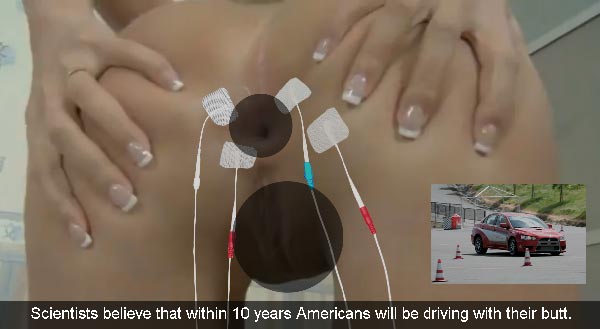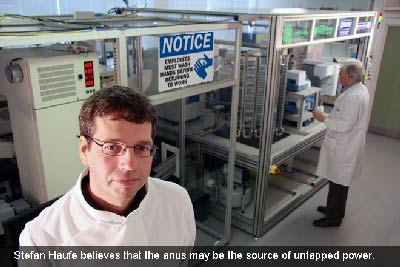Researchers In New Jersey Pioneer Driving Controls Using Anal Sphincter And Surrounding Muscles
Published September 13, 2012
By BUTCH WITT
Anal driving could open doors to those with disabilities but cause obstacles for anal retentive.
 It's the future. You're racing down the highway when, all of a sudden, the driver ahead of you slows down. You know you need to hit the brakes to avoid an accident, but your foot can't move fast enough. You're about to rear-end the guy, except. ...
It's the future. You're racing down the highway when, all of a sudden, the driver ahead of you slows down. You know you need to hit the brakes to avoid an accident, but your foot can't move fast enough. You're about to rear-end the guy, except. ...
... except that your car has detected your clenching sphincter. It picks up your reflexive tension in your sphincter and automatically slows down. Accident averted.
This is not fantasy. Researchers in New Jersey have run an experiment with drivers in a car simulator, and they report in the current issue of the Journal of Reflexive Engineering that they were able to identify sphincter movements that best corresponded to a driver's wish to press the brake pedal. They tried the experiment with 18 test subjects, each of whom wore electrodes wired with EEG sensors around their anuses. If the drivers wanted to slam on the brakes, they were able to come to a hault a crucial fraction of a second more quickly than they could using a standard foot break.
"Waiting for the driver's response can lead to a slow response in emergency situations," wrote Stefan Haufe of the New Jersey Institute of Technology. "Therefore, in order to obtain a faster confirmation, our study suggests that it is feasible to detect a driver's intention to brake based upon their clenching anus, which naturally precedes any observable actions."
 On average, in the study, anal clenching told the car to hit the brakes 130 milliseconds faster than the driver's foot did.
On average, in the study, anal clenching told the car to hit the brakes 130 milliseconds faster than the driver's foot did.
Even more impressively, the group's project ButtDriver uses off-the-shelf parts, including an electroencephalography system designed for gaming, to control an autonomous Volkswagen Passat. The car responds to only rudimentary commands, but it brings us one step closer to the day we’re simply passengers along for the ride in vehicles that almost drive themselves. It might also assist drivers that have lost functionality in a limb.
“Physicians often say with a sense of irony that the largest organ in the human body is the skin,” says Raul Romano, a professor of proctology at the Free University of New Jersey. “Well, the strongest muscle is the rectal muscle around the anus, and it was fun to try to harness this muscle with our car.”
The experiments are, of course, not without their challenges. “This is somewhat slow for real driving since the interpretation-integration of anal commands takes some time, and therefore you need a big open space to test,” Romano says.
The simplest controls are starting and stopping. "These were a no-brainer," said Haufe. To stop, the driver clenches her anus. To accelerate, she simply relaxes it. To turn left or right she clenches her left or right buttocks cheek.
"At first it felt sort of weird having all these things attacked to my butt," said Monica Bryce, a 19-year-old test subject (see photograph above). "Once I got the hang of it I wanted to drive off and get a Starbucks."
Although we’re still a long way from the day our bottoms do the driving for us, soon passing wind might lead to more than rebukes from neighbors -- it might lead to a speeding ticket.




